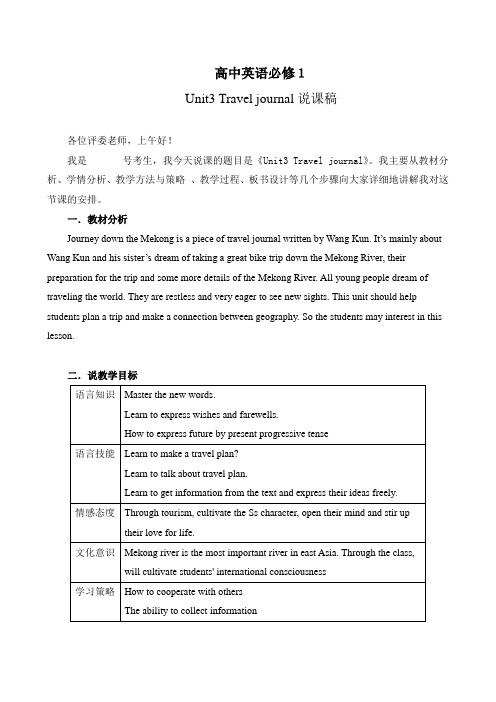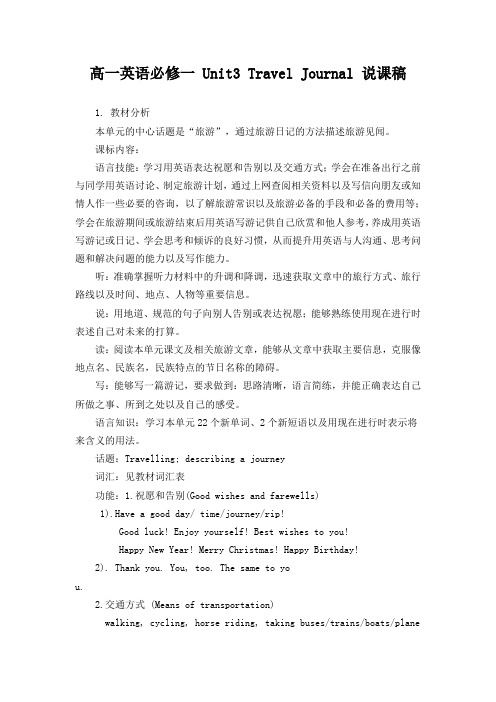人教版高中英语必修1教案Unit3TravelJournal
Travel journal 语法学案(人教版必修1)

Unit 3 Travel journal 语法学案(人教版必修1)一、教学内容必修1 Unit 3 Travel journalThe present continuous tense to express future actions(现在进行时表示将来)二、知识精讲(一)现在进行时表示现在或现阶段正在发生的动作或状态,由am /is /are + doing 构成。
(二)现在进行时的基本用法:1. 表示现在(说话人说话时)正在发生的事情。
例:We are having an English class. 我们在上英语课。
2. 表示现阶段暂时的或正在进行的情况,说话时动作未必正在进行。
例:They are saving money to buy a new car recently.最近他们正在攒钱买车。
3. 表示发展中的或正在改变的情况,常用的动词有get, grow, become,turn, run, go, begin等。
例:The leaves are turning red. 叶子在变红。
It’s getting warmer and warmer. 天越来越热了。
4. 与always, constantly, forever 等词连用,表示反复发生的动作或持续存在的状态,往往带有说话人的主观色彩(赞成、讨厌、生气等情绪)。
例:He is constantly disturbing me while I am working.我工作的时候他老是打扰我。
You are always changing your mind. 你老是改变主意。
即学即用:(1)The traffic in our city is already good and it _____ even better.A. getsB. gotC. has gotD. is getting(2)—What’s the matter? —The shoes don’t fit properly. They _____ my feet.A. are hurtingB. will hurtC. have hurtD. are hurt(3)She ___ when I go to see her.A. is always workingB. always workedC. has always workedD. was always working答案:DAA知识拓展:过去进行时结构为:was/were + doing1. 表示过去某一时刻或某一段时间内正在进行的状态或动作,这一过去时间须用时间状语来表示。
人教版高中英语必修一 Unit3 travel journal 说课稿 全英文

高中英语必修1Unit3 Travel journal说课稿各位评委老师,上午好!我是号考生,我今天说课的题目是《Unit3 Travel journal》。
我主要从教材分析、学情分析、教学方法与策略、教学过程、板书设计等几个步骤向大家详细地讲解我对这节课的安排。
一.教材分析Journey down the Mekong is a piece of travel journal written by Wang Kun. It’s mainly about Wang Kun and his sister’s dream of taking a great bike trip down the Mekong River, their preparation for the trip and some more details of the Mekong River. All young people dream of traveling the world. They are restless and very eager to see new sights. This unit should help students plan a trip and make a connection between geography. So the students may interest in this lesson.二.说教学目标三.教学重点和难点(1)Key point: how to make a travel plan?(2)Difficult point: improve the SS the information processing capability, problem solving ability and self-learning ability as well as the students oral English.四.学情分析My students are first-grade students of senior high school. They have been learning English in junior high school and have accumulated a certain number of vocabularies. They have mastered some simple learning strategies and skills with a preliminary ability of speaking and writing. However, the differences in students' personality and English proficiency are very large. So my teaching design should have gradient to meet the need of different student. Travel is an intresting topic. I will seize the student's psychological characteristics and stimulate students' interest, so that they will learn to participate in the study, and learn to study in the participation五.教学方法和教学工具As is known to us all, a good teaching method requires that the teacher should help the Ss develop good sense of the English language. For achieving these teaching aims, I will use the following methods according to the modern social communication teaching theories.(1) Cooperative learning-for example: Group discussion(2)Task-Based Language Teaching:六.Teaching procedureStep1 Lead in 导入Duty Report (3 mins)When we learn this lesson, students just came back from the National Day not long before. I will take advantage of this opportunity to let the students share their travel experience in class. So they will enjoy the fun of traveling. An then I will introduce the topic of this lesson to the SS: that is how to make plan and preparation for a travel.Purpose: Let the Ss talk about their travel experience will greatly stimulate their interest in participating in the class.Step2 Warming Up(1)List some common transportation means and let the students to discuss theadvantages and disadvantages in groups.Transport Speed Time Needed Safety Coziness PollutionBusCarShipTrainAirplane(2) Let the Ss make a travel plan for themselves. I will guide them in language and content. I will take this opportunity to introduce the present progressive tense to the students.Travel plan●Where are youtraveling to?●How much are youspending on it?●How are yougetting there?●What are youtaking with you for yourtrip?Purpose: Let the SS to know to make a plan. The Ss will learn the Grammar in activity. So they won’t feel it boring.Step3 Pre-reading1.Show the SS a picture of river, ask the SS to guess what the story of this unit mayabout? The students will come to the right answer immediately. They I will aska)Why would people want to see rivers? What do rivers provide?b)How do people make use of rivers in their daily life?2. Show the picture of Mekong to see the courtiers the Mekong River flows through. Then I will list them on the blackboard. Then I will introduce some background information of Mekong to the students.中国、缅甸、老挝、泰国、柬埔寨和越南Purpose: to arouse the Ss interest in learning. Improve the SS language expressing ability.Step4While-reading(1)New wordsConsidering that the new words may affect the understanding of the text, so I will teach the new words to the SS first.Ever since, persuaded, cycling, graduating, finally, schedule, fond of , shortcoming, stubborn, organize. Care about, determined, change her mind, journey, altitude, made up her mind, give in, valleys, pace, bends(2)SkimmingRead the text quickly to get the main idea of this text.(3) Scanning(a)Read the passage again to find the answers:●What was Wang Kun and Wang Wei’s dream?(梦想)●What can they see when they travel along the Mekong?(看到什么)●Will they have some difficulties in their journey? What are they?(遇到的困难)(b). Find some difficult sentences in the text.(4) Group discussionDiscuss Wangwei’s and Wangkun’s attitude on the trip then list you own opinion on exercise.2Purpose: To develop students’ basic reading skills of skimming, scanning and careful reading and the ability to catch the main idea of the passageStep5Post-reading1. Retell the text using the words you have just learned.2. Work in pairs to make up a dialogue using the information from the passage.Purpose: To develop the Ss language express ability.Step 6 Homework (1 min)1.Write a journal about your last travel.2.Preview the reading on page 18, and think of the questions in pre-reading.Purpose: The SS will review what we have learned in this lesson. And it is will also be a preparation for next class. It will help the SS form the habit of self learning and independent thinking.。
高中英语人教版必修1教案-【课件设计】unit3_Travel_journal_Period_1_英语

Wang Kunand his sister Wang Weaire dreaming
of taking a great bike trip
Where and How
They have the idea to c_y_c_le _a_lo_n_g_the Mekong River. Fromw_h__er_e__ it _b_e_g_in_s_tow_h_e_r__ itends _____. e
• What to prepare for your trip
Homework:
1. Read the passage as fluently as possible after class.
2. Preview Learning about Language.
How
Wh
Please use at least three adjectives to describe Wang Wei according to Para2, and give your reasons.
Stubborn, determined, risktaking, imaginative, brave/courage, excited
What countries does the Mekong
River flow through?
Myanmar
Chin a Laos
Thailand
Cambodi a Vietnam
a
the main idea of each paragraph:(choose A.B.C )
Paragraph 1:_D_r_e_a_m________
Choose 5 that you think are the most useful, and give your reasons why you choose them.
人教版高中英语必修一+Unit+3+Travel+Journal+Period+1+教案1.doc

精美句子1、善思则能“从无字句处读书”。
读沙漠,读出了它坦荡豪放的胸怀;读太阳,读出了它普照万物的无私;读春雨,读出了它润物无声的柔情。
读大海,读出了它气势磅礴的豪情。
读石灰,读出了它粉身碎骨不变色的清白。
2、幸福幸福是“临行密密缝,意恐迟迟归”的牵挂;幸福是“春种一粒粟,秋收千颗子”的收获. 幸福是“采菊东篱下,悠然见南山”的闲适;幸福是“奇闻共欣赏,疑义相与析”的愉悦。
幸福是“随风潜入夜,润物细无声”的奉献;幸福是“夜来风雨声,花落知多少”的恬淡。
幸福是“零落成泥碾作尘,只有香如故”的圣洁。
幸福是“壮志饥餐胡虏肉,笑谈渴饮匈奴血”的豪壮。
幸福是“先天下之忧而忧,后天下之乐而乐”的胸怀。
幸福是“人生自古谁无死,留取丹心照汗青”的气节。
3、大自然的语言丰富多彩:从秋叶的飘零中,我们读出了季节的变换;从归雁的行列中,我读出了集体的力量;从冰雪的消融中,我们读出了春天的脚步;从穿石的滴水中,我们读出了坚持的可贵;从蜂蜜的浓香中,我们读出了勤劳的甜美。
4、成功与失败种子,如果害怕埋没,那它永远不能发芽。
鲜花,如果害怕凋谢,那它永远不能开放。
矿石,如果害怕焚烧(熔炉),那它永远不能成钢(炼成金子)。
蜡烛,如果害怕熄灭(燃烧),那它永远不能发光。
航船,如果害怕风浪,那它永远不能到达彼岸。
5、墙角的花,当你孤芳自赏时,天地便小了。
井底的蛙,当你自我欢唱时,视野便窄了。
笼中的鸟,当你安于供养时,自由便没了。
山中的石!当你背靠群峰时,意志就坚了。
水中的萍!当你随波逐流后,根基就没了。
空中的鸟!当你展翅蓝天中,宇宙就大了。
空中的雁!当你离开队伍时,危险就大了。
地下的煤!你燃烧自己后,贡献就大了6、朋友是什么?朋友是快乐日子里的一把吉它,尽情地为你弹奏生活的愉悦;朋友是忧伤日子里的一股春风,轻轻地为你拂去心中的愁云。
朋友是成功道路上的一位良师,热情的将你引向阳光的地带;朋友是失败苦闷中的一盏明灯,默默地为你驱赶心灵的阴霾。
高一英语必修一 Unit3 Travel Journal 说课稿

高一英语必修一 Unit3 Travel Journal 说课稿1. 教材分析本单元的中心话题是“旅游”,通过旅游日记的方法描述旅游见闻。
课标内容:语言技能:学习用英语表达祝愿和告别以及交通方式;学会在准备出行之前与同学用英语讨论、制定旅游计划,通过上网查阅相关资料以及写信向朋友或知情人作一些必要的咨询,以了解旅游常识以及旅游必备的手段和必备的费用等;学会在旅游期间或旅游结束后用英语写游记供自己欣赏和他人参考,养成用英语写游记或日记、学会思考和倾诉的良好习惯,从而提升用英语与人沟通、思考问题和解决问题的能力以及写作能力。
听:准确掌握听力材料中的升调和降调,迅速获取文章中的旅行方式、旅行路线以及时间、地点、人物等重要信息。
说:用地道、规范的句子向别人告别或表达祝愿;能够熟练使用现在进行时表述自己对未来的打算。
读:阅读本单元课文及相关旅游文章,能够从文章中获取主要信息,克服像地点名、民族名,民族特点的节日名称的障碍。
写:能够写一篇游记,要求做到:思路清晰,语言简练,并能正确表达自己所做之事、所到之处以及自己的感受。
语言知识:学习本单元22个新单词、2个新短语以及用现在进行时表示将来含义的用法。
话题:Travelling; describing a journey词汇:见教材词汇表功能:1.祝愿和告别(Good wishes and farewells)1).Have a good day/ time/journey/rip!Good luck! Enjoy yourself! Best wishes to you!Happy New Year! Merry Christmas! Happy Birthday!2). Thank you. You, too. The same to you.2.交通方式 (Means of transportation)walking, cycling, horse riding, taking buses/trains/boats/plane语法:现在进行时表示将来When are you leaving?How are you going there?Where are you staying?How long are you staying there?When are you coming back?情感态度和价值观:通过课文的学习,要求同学们能够积极参与关于旅行准备、旅游见闻、旅游感受等方面的交流活动,用准确的英语描述国内外的重要景观、名胜古迹以及一些当地的旅游文化节日。
人教高中英语 必修一 Unit3 travel-journal-课件(共20页)

To eat delicious food
A: Why do you travel? B: I want to increase my knowledge.
How do you go?
by bike
by plane/ air
?
by car
A: How do you go to Beijing?
3. How do you go? ……
.. 3
When traveling, what should you pay attention to?
No Littering
No Drawing
No trampling
No spitting
Summary and Homework
Today, we have learned how to talk about travel, you should practice more after class. And then do the exercises on P56.
Thank you!
B: I would like to go there by train.
The National Day is coming, now your group discuss different ways of going where and your reasons.
A: Do you like travel? B: Of course! A: The National Day is coming, where do you want to go? B: I want to . A: Why do you want to go there? B: I want to . A: How do you go there? B: . A: Great. Have a good time. B: Thanks.
最新人教版高中英语必修一unit 3《travel journal》第2课时教案.doc

Unit3Travel JournalⅠ教学目标:词汇:abandoned,desert,scenery,shoot,Afghanistan(Ghan),Afghans 短语:a way to do sth.,not…any more,pass a law,Ⅱ重难点突破:1.Australians needed a way to travel to the middle of the country.They triedriding horses,but the horses didn’t like hot weather and sand.澳大利亚人需要一条通往中部的路,他们尝试骑马去那儿,但马儿不适应炎热的天气和沙地。
a way to do sth./of doing sth.(做……的方法,途径)try to do sth.与try doing sth.2.Ghan is short for Afghanistan.Ghan是阿富汗(Afghanistan)的缩写。
be short for vt.为……的缩写be short of=lack缺乏…;短少;to be short简单地说,简言之;run short vi.(物品)不足,短缺;shortage n.不足,短缺,匮乏典型例题:WTO is short__________the World Trade Organization.A.ofB.forC.toD.with3.Camels are much better than horses for traveling a long distance.形容词比较级前可以加上表示程度的副词。
如:much,far,even,a lot,a great deal,rather,a bit,a little等。
eg.She is far more beautiful than before.她比以前可漂亮多了。
人教版高中英语必修一+Unit+3+Travel+Journal+Period+2+教案1.doc

Unit 3 Travel journalGrammar学案I. Teaching goals:1. To discover and learn to use some useful words and expression2. To learn about the present continuous tense for future actions.II. Teaching important points:the present tense for future use.III. Teaching proceduresStep 1. ReviewGo over the reading passage briefly again.Step2. Discovering useful structure.Turn to page21 and finish exercises 2 and 3.Step3. Grammar现在进行时表示将来当句子涉及确切的计划、明确的意图和为将来安排好的活动时, 现在进行时可用于表示将来。
1) come, go, stay, arrive, leave 等词的现在进行时经常用于表示将来确切的计划。
2) 表示交通方式、行程安排的动词,例如fly, walk, ride, drive, take (a bus, a taxi)等的现在进行时也经常用于表示将来。
Step4 Exercises for consolidation.1. Betty ________ (leave) for Guangzhou by plane at 3:00 this afternoon. Her brother Bob ________ (see) her off. It’s half past one now. They __________ (wait) for a taxi outside the school gate.2. The Browns ________ (go) to the North China by train next week. They __________ (stay) in Beijing for a week. They ________ (go) to Xi’an. They __________ (get) th ere by air.3. Some friends _________ (come) to Anne’s birthday party this evening. Anne’s mother __ (be) busy ______ (get) ready for the birthday dinner. Anne _________ (help) her mother now.key:1. is leaving, is seeing , are waiting2. are going, are staying, are going, are getting3. are coming, is getting, are helping另外, 表示将来的动作或状态,还可用以下几种形式:1) will / shall+动词原形Eg. I shall be seventeen years old next month.2) be going to+动词原形:表示即将发生的或最近打算进行的事。
- 1、下载文档前请自行甄别文档内容的完整性,平台不提供额外的编辑、内容补充、找答案等附加服务。
- 2、"仅部分预览"的文档,不可在线预览部分如存在完整性等问题,可反馈申请退款(可完整预览的文档不适用该条件!)。
- 3、如文档侵犯您的权益,请联系客服反馈,我们会尽快为您处理(人工客服工作时间:9:00-18:30)。
人教版高中英语必修1教案Unit 3Travel urnalUnit3TravelurnalPartne:TeahingDesignPerid1:Asapleles snplanfrreadingAisTtalabuttravelingTreadabuttravelin gPreduresIaringup1aringupbdisussingGdrning,lassDul ietraveling?hdulietraveling?Andhnt?herehaveueverbee nbefre?Hdidugetthere?Ifuaregivenahanettravelarundt herld,hatindftransprtatinsilluuseandh?Nlatthefllingpit uresanddisussitinpairsNaefthetransprtatinseansftrans prtatinReasnsbarbbiebplanebtrainbbusbshipinahtball nbtrbiebeepbtruinaplate2aringupblingandspeaingNbs andgirls,hatduneedttaeithuifuarepreparingfrabietripal ngthehangiangRiver?Latthepituresandtellthehlelasshi hbetuthinisthestusefulandhihneistheleastusefulGivear easnhuthins3aringupbasingandanseringNsuppseulivei nQinghaiuplantspendahlidaithafriendsehereinSutheas tAsiauhavebeengivenahanethsethreeplaestvisitPleasef indutthene-afaretgettherefrdifferentindsftransprtatinP erhapsuantntheexatfare,butuanguesshuhthefareisPlea sehaveashrtdisussinithurpartnersandthendeideheretg,nI’dlieutasurpartnerthefllingquestins1hereareugingnhlid a?2henareuleaving?3Hareugingt…?4henareuarrivingin /at…?hereareustaing?6Hlngareustaingthere?7henareui ngba?IIPre-reading1IagingandsharingDulietravelingal ngariver,agreatriver?hatrledesariverplainpeple’slife?Intherrds,hdpeplehlivealngariveruseit?Thesugges tedansers:PepleandrintheaterinariverrashtheirlthesPep leansiinariverinsuerPepleanusearivertirrigatetheirfields PepleanusearivertprdueeletriitPepleantravelalngariver 2TalingandsharingAsealln,therearealtfriversintherldan dalsthereareangreatriversNlatthehartIntheleftlunarena esfsegreatriversIntherightlunarelatinsheretheriverslieP leaseaththeathanserNaesfRiverLatinNaesfRiverLatinengIndiaenghina,SEAsiaRhineFraneRhineGeranGangesRussiaGangesInd iaSeineEnglandSeineFraneNileentralAfriaNile EgptThaesGeranThaesEnglandngBrazilngentralAfriaNigerhina,SEAsiaNigerestAfriaVlgaUSVlgaRussiaDanube EgptDanubeentralEurpeAaznestAfriaAaznBrazilississip pientralEurpeississippiUSIIIReading1Readingaludtther erdingDunhatuntriestheengRiverflsthrugh?Nlattheapf theengRiverandpintuttheuntriesitflsthrugh,tdae’regingtreadapassageabutURNEDNTHEENGPleaseliste nandreadaludabutthererdingfthetextURNEDNTHEENG Paattentinttheprnuniatinfeahrdandthepausesithineahs enteneIillplathetapetieandushallreadaludtie,t2Reading andunderliningNpleasereadandunderlinealltheusefule xpressinsrllatinsinthepassageptheturntebafterlassashe rllatinsfrURNEDNTHEENGdreaabut,taeagreatbietrip,gr aduatefr,gtthehanetdsth,lealngtheriver,gfrlngbierides, untainbie,persuadesbtdsth,grup,getsbinterestedinsth, bestubbrn,nthebestafgettingtplaes,thesureftheriver,ar eabut,givesbadeterinedl,hangene’sind,atanaltitudef,seetd,theairbehardtbreathe,anintere stingexperiene,aeupnesind,givein,alargeatlasithgdaps, eepdingsth,atfirst,passthrugh,besurprisedtdsth,halff,at last,theSuthhinaSea3ReadingaludandunderstandingN extearegingtreadaludthetextandthenansersequestins1) hareangunandangei?2)hatastheirdrea?3)hareDaeianduHang?4)hereisthesureftheengRiverandhihseadesitenter?) hatanuseehenutravelalngtheeng?6)Isitadiffiulturnetlealngtheeng?h?4Disussingehavegtth egeneraleaningfthepassage,andenangeiandangunhav esesiilaranddifferentattitudesabutthetripuahaveashrtd isussinithurpartnersandthenfillinthehartSiilarattitudes abutthetripDifferentattitudesabutthetripBthangeianda ngunthins:1)taingthistripisadreathatestrue2)thattheille nthistripalt3)theshuldseealtftheeng4)thatstftheengillb efundinSutheastAsiaangeibelieves:1)theuststartinQing haiheretheriverbegins/seeallftheeng2)thatthedn’tneedtprepareuhangunbelieves:1)itistldandhightstarti nQinghai2)thatusinganatlasisveriprtantIVlsingdnlsing dnbanseringquestinshatshuldudbefretraveling?hatillurfailandurfiendssahen uleavehettravel?lsingdnbtranslatingInthelastfeinutesu areasedttranslatesediffiultsentenesinthepassageAssig nentRevisethententsfthepassagepletethepassagenPag e6inrbDexerise2npage7inuexerisebsPerid2:Asapleless nplanfrLearningabutLanguageAisTlearnabutthePresen tntinuusTenseTdisveranduseseusefulrdsandexpressins PreduresIaringuparingupbdisveringusefulrdsandexpre ssinsHelleverneAfterreadingthepassage,ehavegttnthe usageftherdsandexpressins,buteshulddrepratieNturnt page20tfindtherretrdsandexpressinsfrthepassagetfinis hthesentenesuaregiventinutestfinishtheanddisussithur partnersTinuteslater,heinpairsandthenheiththehlelassII Learningabutlanguage1ReadingandfindingGd,uhavea steredtheserdsandexpressinsLet’sturntpage17andlatthequestinsinaringup4Underlineth everbsinthequestins,andpaattentinttheverbfrsanddsee xplanatinsburselves2LearningGraareanseethattheverb sareallusedinthe“-ing”frTheare “thepresentntinuustense”,buttheexpressfutureatinsr plansThePresentntinuusTenseabeusedtdenteanatintha tanbepre-plannedrprearrangedinsteadfthefutureindefiniteinllquialEnglishButpleasentethat,ntallverbsanbeus edinthe“-ing”frtexpressfutureatinsSuhverbsase,g,leave,fl,al,ride,driv e,sta,eet,die,see,have,arriveetareainlusedinthe“-ing”frtexpressfutureatins3DingexerisesN2and3npage21Nt urntpage21anddexerise2Inthedialgueanespaperreprte risintervieingangeiabutherplansfrthetripalngtheengRi verHever,thearentsureabutseftheverbtensesanuhelpth epletetheirnversatin?Let’sntinuetdexerise3Duhaveanplansfrthefutureurselves?If uhavean,pleaseusethePresentntinuusTensetexpressurf utureatinsGiveasuhinfratinasuanIIIReadusedaterialsfrt hepresentntinuustensefrfutureatinsrplansbe+v-ing与表示以后的时刻连用,表示不久的以后,含义是“预定要做”。
